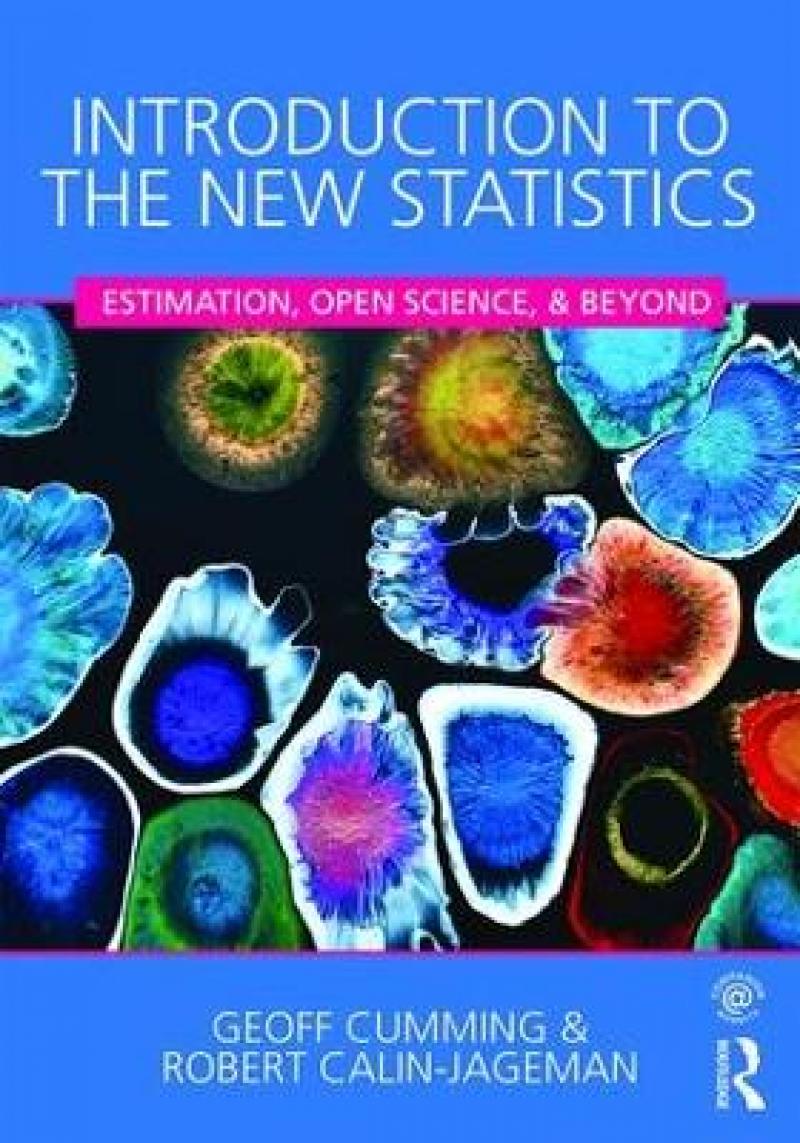This is the first introductory statistics text to use an estimation approach from the start to help readers understand effect sizes, confidence intervals (CIs), and meta-analysis (‘the new statistics’). It is also the first text to explain the new and exciting Open Science practices, which encourage replication and enhance the trustworthiness of research. In addition, the book explains NHST fully so students can understand published research. Numerous real research examples are used throughout. The book uses today’s most effective learning strategies and promotes critical thinking, comprehension, and retention, to deepen users’ understanding of statistics and modern research methods. The free ESCI (Exploratory Software for Confidence Intervals) software makes concepts visually vivid, and provides calculation and graphing facilities. The book can be used with or without ESCI.Other highlights include:- Coverage of both estimation and NHST approaches, and how to easily translate between the two. - Some exercises use ESCI to analyze data and create graphs including CIs, for best understanding of estimation methods. -Videos of the authors describing key concepts and demonstrating use of ESCI provide an engaging learning tool for traditional or flipped classrooms.-In-chapter exercises and quizzes with related commentary allow students to learn by doing, and to monitor their progress.-End-of-chapter exercises and commentary, many using real data, give practice for using the new statistics to analyze data, as well as for applying research judgment in realistic contexts. -Don’t fool yourself tips help students avoid common errors. -Red Flags highlight the meaning of "significance" and what p values actually mean. -Chapter outlines, defined key terms, sidebars of key points, and summarized take-home messages provide a study tool at exam time. -http://www.routledge.com/cw/cumming offers for students: ESCI downloads; data sets; key term flashcards; tips for using SPSS for analyzing data; and videos. For instructors it offers: tips for teaching the new statistics and Open Science; additional homework exercises; assessment items; answer keys for homework and assessment items; and downloadable text images; and PowerPoint lecture slides.Intended for introduction to statistics, data analysis, or quantitative methods courses in psychology, education, and other social and health sciences, researchers interested in understanding the new statistics will also appreciate this book. No familiarity with introductory statistics is assumed.
Les mer
1. Asking and Answering Research Questions 2. Research Fundamentals: Don’t Fool Yourself 3. Picturing and Describing Data 4. The Normal Distribution and Sampling 5. Confidence Intervals and Effect Sizes 6. p Values, Null Hypothesis Significance Testing, and Confidence Intervals 7. The Independent Groups Design 8. The Paired Design 9. Meta-Analysis 10. Open Science and Planning Research 11. Correlation 12. Regression 13. Frequencies, Proportions, and Risk 14. Extended Designs: One Independent Variable 15. Extended Designs: Two Independent Variables 16. Future Directions
Les mer
"I envision a day when most textbooks will focus on estimation and meta-analytic thinking as this text does but Geoff Cumming’s book is definitely pioneering this journey. … The voice and pace of the text is engaging. …The videos … [are] one of the bestselling points of the text. … I would certainly … adopt this book for my introductory statistics courses. … I have never read a statistics text that introduced concepts in the way provided in this text—clear and simple examples that "informally" allow the reader to integrate several concepts into their thinking. … Even the more statistically anxious students would be put at ease. ... ESCI allows for students to easily manipulate multiple values and instantly see what happens as a result of that manipulation." - Susan Troncoso Skidmore, Sam Houston State University, USA"There are many introductory statistics books on the market, but this one [is] especially well-positioned to capitalize on the growing interest … for moving away from relying solely on NHST. ...The author is a well-known and respected advocate of this approach. ….The focus on estimation, meta-analysis, and research integrity … will be embraced by many instructors. ...The writing style is appealing, showing the author to be an excellent teacher. ...The ESCI software will be useful for classroom demonstrations as well as for individual learning. The videos are outstanding – the video on dancing p-values changed the way my graduate students interpret research." – Dale Berger, Claremont Graduate University, USA"The concepts are developed in interesting contexts and examples. … The ESCI tools are amazing. … The exercises … are excellent, numerous, and likely to be a great help to instructors. … The supplemental material … is impressive and likely to be … persuasive in adoption decisions. … The obvious market is the Intro Stats for psychology market. Strengths: The author’s ability to communicate statistical concepts; His authoritative grasp of NHST principles, research, and practices; His understanding of, and enthusiasm for, estimation methods; The ESCI … exercises." – Bruce Blaine, St. John Fisher College, USA"It is a brilliant book for two main reasons: it uses an estimation approach from start to finish to help readers to understand effect sizes, confidence intervals and meta-analysis, so important in play therapy research. Even better, it is the first text to explain the new and exciting Open Science practices which encourage replication and enhance the trustworthiness of research. (...) APAC are recommending the book as essential reading for MA students. Also for all others who want to master the black art of statistics in 16 intensive lessons." - Jeff Thomas, The Journal of the International and UK Societies of Play and Creative Arts Therapies
Les mer
Produktdetaljer
ISBN
9781138825529
Publisert
2016-10-05
Utgiver
Vendor
Routledge
Vekt
1100 gr
Høyde
254 mm
Bredde
178 mm
Aldersnivå
UU, 05
Språk
Product language
Engelsk
Format
Product format
Heftet
Antall sider
564
